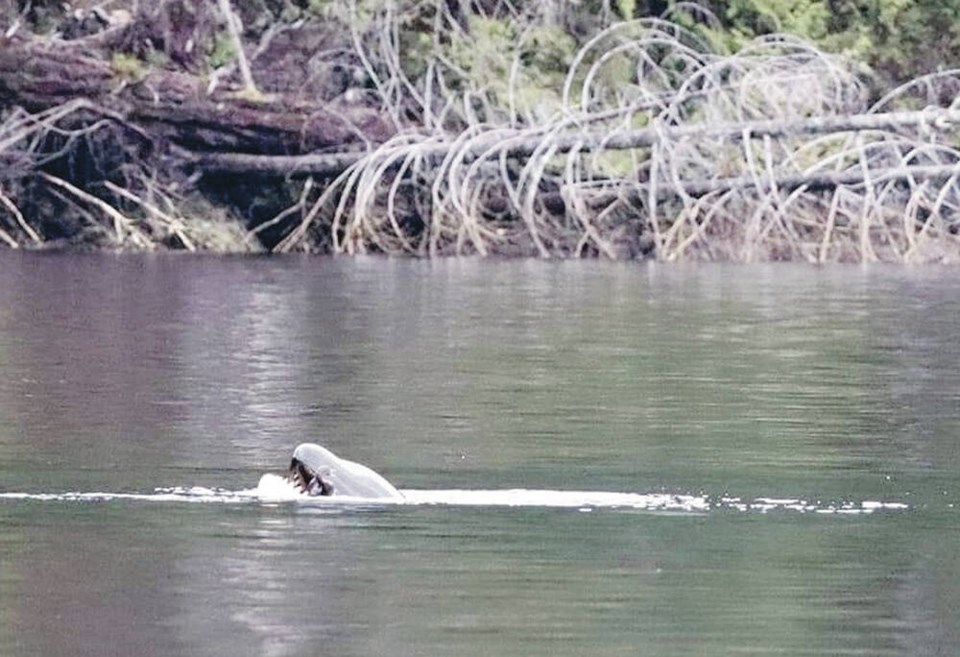Rescue efforts for an orphaned orca calf in a lagoon near Zeballos are being paused for the next few days due to shifting tides.
Paul Cottrell, the Pacific marine mammal co-ordinator with Fisheries and Oceans Canada, said officials and local First Nations are “monitoring and assessing” the animal from afar this weekend.
He said the orca calf has been photographed with a bird in its mouth, indicating it’s foraging for food on its own, but the timeline to successfully free it is likely short.
High tide levels are expected to improve next week.
The Department of Fisheries and Oceans said the break would provide those working on the operation to carry out equipment maintenance and repair, as well as get some needed rest.
The young orca, which has been named k史iisa岣蕯is (kwee-sa-hay-is) or Brave Little Hunter, is refusing to leave the lagoon after its pregnant mother became beached and died last Saturday.
Despite the rescue effort, the calf has yet to pass over a sandbar that its mother got stuck on before dying in shallow waters.
The pause will allow responders to determine next steps with the Ehattesaht and Nuchatlaht First Nations once tide conditions are more conducive for another attempt, DFO said in an update Friday.
Cottrell said they are using drones to observe the animal and assess its body condition as they wait more favourable tides in the coming days.
“Ideally, the animal leaves the lagoon on its own,” Cottrell said.
On Thursday afternoon, a group of 11 vessels used oikomi pipes to form a sound wall in an attempt to persuade the calf to leave. The metal pipes are banged to make noise to lead whales away from danger.
Working together in a line, the vessels were able to move the calf from the deeper part of the lagoon toward the narrow exit point, but the calf would not make the final trek over the sandbar where its mother was stranded.
In a statement issued Friday, the Ehattesaht First Nation said the plan was working until the calf’s flight-or-fight instincts took over and she swam underneath the vessels and back into the deeper end of the lagoon.
“In the end, little k史iisa岣蕯is was not ready to move through the gap and into Little Espinosa,” the statement said. “Everyone was pretty let down.”
It was a stressful time for the calf, as she did not know that responders were trying to help, the Nation said.
Ehattesaht Nation had a feast and gave the calf her proper naming ceremony that night.
“We had the children witness it and that is very important because now they must all remember her name and carry this story,” the statement said.
DFO spokeswoman Leri Davies confirmed that DFO is considering a trap-and-transport for the calf but will not attempt that until all other options have been exhausted due to the risks the method poses to the calf and the responders.
The rescue has extra challenges due to the lagoon’s distance from major urban centres, she said in a statement.
The First Nation’s statement said the mother whale’s death and efforts to free the orphaned calf have put a spotlight on their small Island community. The smallest municipality in 小蓝视频, Zeballos is a two-and-a-half hour drive from Campbell River and has limited to no cellular phone coverage and broadband internet.
“It’s been a challenging community for many years,” the statement said. “We lose power in our community almost every storm and sometimes that lasts for a week.”
Industries such as forestry, mining and fishing have come and gone, the statement said, and education and basic services for the Nation’s members are lacking, but “we have a plan to fix it.”
“We really have been working at this for the past decade and are really about to make some real progress for our people, for everyone in Zeballos.
“Everyone talks a lot about Reconciliation and in some ways this story is helping bring some of that work right to our doorsteps.”
— with files from The Canadian Press
>>> To comment on this article, write a letter to the editor: [email protected]




